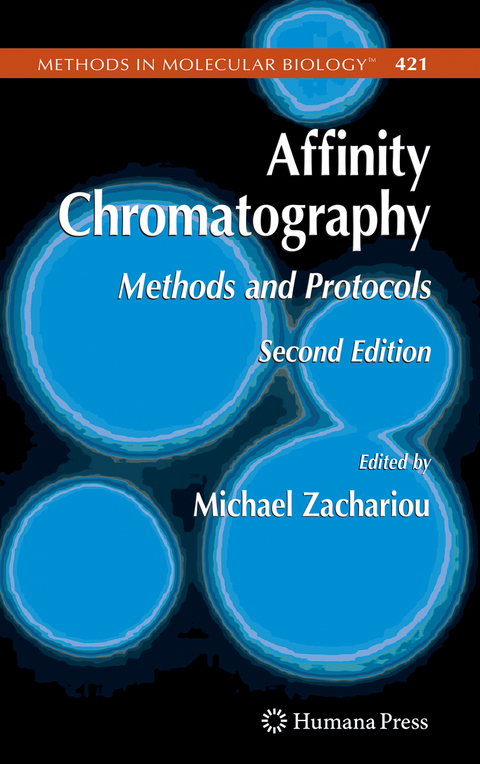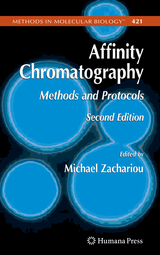Affinity Chromatography
Humana Press Inc. (Verlag)
978-1-58829-659-7 (ISBN)
Preface.- Contributors.- Affinity Chromatography: History, Perspectives, Limitations and ProspectsAna Ceclia A. Roque and Christopher R. Lowe 1.- Various Modes of Affinity Chromatography.- Immobilized Metal Ion Affinity Chromatography of Native ProteinsAdam Charlton and Michael Zachariou.- Affinity Precipitation of Proteins Using Metal ChelatesAshok Kumar, Igor Yu. Galaev, and Bo Mattiasson.- Immunoaffinity ChromatographyStuart R. Gallant, Vish Koppaka, and Nick Zecherle.- Dye Ligand ChromatographyStuart R. Gallant, Vish Koppaka, and Nick Zecherle.- Purification of Proteins Using Displacement ChromatographyNihal Tugcu.- Affinity Chromatography Using Purification Tags.- Rationally Designed Ligands for Use in Affinity Chromatography: An Artificial Protein LAna Ceclia A. Roque and Christopher R. Lowe.- Phage Display of Peptides in Ligand Selection for Use in Affinity ChromatographyJoanne L. Casey, Andrew M. Coley, and Michael Foley.- Preparation, Analysis and Use of an Affinity Adsorbent for the Purification of GST Fusion ProteinGareth M. Forde.- Immobilized Metal Ion Affinity Chromatography of Histidine-Tagged Fusion ProteinsAdam Charlton and Michael Zachariou.- Methods for the Purification of HQ-Tagged ProteinsBecky Godat, Laurie Engel, Natalie A. Betz, and Tonny M. Johnson.- Amylose Affinity Chromatography of Maltose-Binding Protein: Purification by both Native and Novel Matrix-Assisted Dialysis Refolding MethodsLeonard K. Pattenden and Walter G. Thomas.- Methods for Detection of Protein–Protein and Protein–DNA Interactions Using HaloTagMarjeta Urh, Danette Hartzell, Jacqui Mendez, Dieter H. Klaubert, and Keith Wood.- Site-Specific Cleavage of Fusion ProteinsAdam Charlton.- The Use of TAGZyme for the Efficient Removal of N-Terminal His-TagsJose? Arnau, ConniLauritzen, Gitte Ebert Petersen, and John Pedersen.- Various Applications of Affinity Chromatography.- Affinity Processing of Cell-Containing Feeds Using Monolithic Macroporous Hydrogels, CryogelsIgor Yu. Galaev and Bo Mattiasson.- Monolithic Bioreactors for MacromoleculesMojca Ben?ina, Katja Ben?ina, Aleš Podgornik, and Aleš Štrancar.- Plasmid DNA Purification Via the Use of a Dual Affinity ProteinGareth M. Forde.- Affinity Chromatography of Phosphorylated ProteinsGrigoriy S. Tchaga.- Protein Separation Using Immobilized Phospholipid ChromatographyTzong-Hsien Lee and Marie-Isabel Aguilar.- Analysis of Proteins in Solution Using Affinity Capillary ElectrophoresisNiels H. H. Heegaard, Christian Schou, and Jesper Østergaard.
| Reihe/Serie | Methods in Molecular Biology ; 421 |
|---|---|
| Zusatzinfo | 47 Illustrations, black and white; XII, 348 p. 47 illus. |
| Verlagsort | Totowa, NJ |
| Sprache | englisch |
| Maße | 152 x 229 mm |
| Themenwelt | Naturwissenschaften ► Biologie ► Mikrobiologie / Immunologie |
| Naturwissenschaften ► Biologie ► Zellbiologie | |
| Naturwissenschaften ► Chemie ► Analytische Chemie | |
| Schlagworte | Interaction science • Post-genomic era • Purification tags • Separation techiques |
| ISBN-10 | 1-58829-659-8 / 1588296598 |
| ISBN-13 | 978-1-58829-659-7 / 9781588296597 |
| Zustand | Neuware |
| Informationen gemäß Produktsicherheitsverordnung (GPSR) | |
| Haben Sie eine Frage zum Produkt? |
aus dem Bereich




